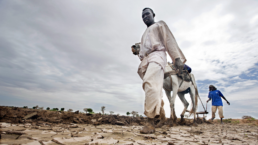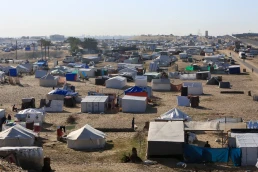As nations converge at COP 27 in Egypt, a climate-driven crisis unfolds in Nigeria and across Africa.
by Obiora Ikoku, The Progressive Magazine
As world leaders gather at the resort town of Sharm El-Sheikh in Egypt for the COP 27 United Nations climate conference, the ongoing flooding in Nigeria, which has wreaked havoc across the country, is a cruel reminder that climate change is already a catastrophic reality for many African countries.
Beginning in late September, the worst floods to hit Nigeria since 2012 have overrun hundreds of communities. Thirty-three out of Nigeria’s thirty-six states—representing a whopping 92 percent of the entire country’s landmass—have been affected—some are still completely submerged. So far, more than 600 people have been killed and 1.4 million people displaced, 60 percent of whom are children.

Now, as many fear, the worst famine in decades may be underway. The flooding started at the beginning of a harvest season many had hoped would curb an economic crisis that has seen food inflation rise to 23 percent. Some of the affected states are agrarian economies and account for a range of the nation’s food products like yams, sweet potatoes, rice, cocoa, vegetables, maize, cotton, groundnuts, and sorghum.
More than 392,399 hectares of farmland have been destroyed by the flooding. Olam Nigeria, which produces a quarter of Nigeria’s rice, lost about 10,000 acres of its farmland to the flood, causing a shortfall that has led to a spike in prices. At the moment, the price of a 110-pound bag of rice has jumped by 40.8 percent, to about $109, in a country where the national monthly minimum wage is about $68.
Recent Posts
Why Are Democratic Lawmakers Still Meeting With Netanyahu?
July 12, 2025
Take Action Now Pictures show Democrats like Chuck Schumer standing next to Netanyahu, smiling.By Sharon Zhang, Truthout A bipartisan group of…
Stop Israel’s Dystopian “Humanitarian City” Plan—Before It’s Too Late
July 11, 2025
Take Action Now For the past 20 months, the world has watched—and largely enabled—a genocidal campaign in Gaza. Over 55,000 Palestinians have been…
The “Liberal” International Order Is Criminalizing Palestine Protests
July 11, 2025
Take Action Now As Western governments repress Palestine solidarity and enable Israel’s impunity, the “liberal international order” is no longer…
Politicians Are Betraying Gen Z On Climate
July 10, 2025
Take Action Now While Gen-Zers thrift, knit, crochet, and find other ways to reduce our footprints, Trump and the GOP are greenlighting more climate…




